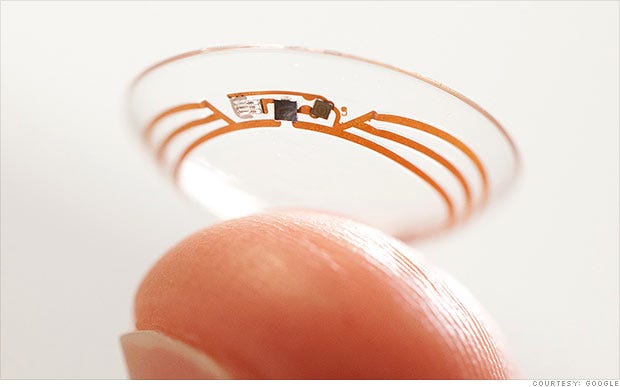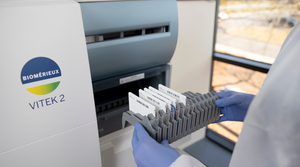Google Spin-Off Verily May Have Overhyped Tech
June 8, 2016
Verily allows for hits and misses, the company responds.
Nancy Crotti
|
The glucose-reading contact lens that Verily is working on with Novartis? It'll never work, outside sources told STAT. (Image courtesy of Verily) |
Big ideas sometimes fall flat. That's apparently OK with the folks at Google's life sciences sister company, Verily, but not so much with skeptical outside scientists.
That's the fallout from a report earlier this week on the Boston Globe's science and health website STAT, questioning Verily's abilities to produce anything meaningful from its much-ballyhooed projects.
The glucose-reading contact lens that the company is working on with Novartis? It'll never work, outside sources told STAT.
The Star-Trek-inspired "Tricorder," which was supposed to diagnose and help cure cancer? Verily CEO Andrew Conrad promised employees a working prototype in six months. That was three years ago. The prototype didn't pan out and the project is "floundering," former employees told STAT.
Stanford University researchers and others are also pursuing a working version of the elusive diagnose-and-cure-all Tricorder. David Walt, a Tufts University chemistry professor and nanoscience expert, said Verily's version doesn't even qualify for the title "science fiction." It's "science fantasy," said Walt, who previously met with Verily to discuss the project.
"A STAT examination found that all of them are plagued by serious, if not fatal, scientific shortcomings, even as Verily has vigorously promoted their promise," the report says.
The website previously reported on an exodus of senior Verily staff, chaotic management and poorly-thought-out projects. It did not question the work that Google has been doing with Dexcom to produce a continuous glucose monitor in 2018.
Verily initially declined comment, but apparently changed its mind. Speaking at the BIO International Convention a medtech conference in San Francisco, Verily chief medical officer Jessica Mega, MD, said that the company's creative culture allows for hits and misses.
The details of Verily's plans remain largely guarded from the public view. The company has talked about its collaboration with Johnson & Johnson on surgical robotics (now known as Verb Surgical) and its study called "Baseline" that plans on studying 10,000 people over five years to quantify what it means to be healthy. Determining that benchmark could then be used to help detect the early signs of cancer and heart disease, Verily has said.
Several prominent researchers have called Baseline too small and too short in duration to accomplish its main goals, according to STAT. FDA chief Robert Califf, who headed the Baseline study for Verily at Duke University, defended the research as a deep look at a small group of people.
Califf pooh-poohed the naysayers, telling STAT, "What I tell trainees is that if you're doing clinical research and you're not being criticized, you're probably not doing anything important."
Nancy Crotti is a contributor to Qmed.
Like what you're reading? Subscribe to our daily e-newsletter.
About the Author(s)
You May Also Like


